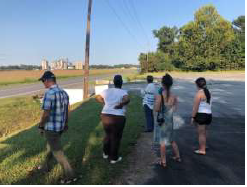Woods brings science to N.C. communities’ fight against environmental hazards
January 31, 2022

Dr. Courtney Woods
For more than a decade, Courtney Woods, PhD, has focused on participatory research, a method that allows her to tap local expertise to support communities experiencing environmental racism. With funding from the Z. Smith Reynolds Foundation, she created the Environmental Justice Action Research Clinic (EJ Clinic) to support local responses to environmental health concerns.
“We aim to orient students and faculty towards participatory, action-oriented research that advances the work of community organizers towards environmental justice and that transforms the way academics understand and approach environmental health issues,” said Woods, assistant professor and MPH program director in the Gillings School’s Department of Environmental Sciences and Engineering. “We hope the work of the clinic will enhance the capacity and effectiveness of community organizing efforts and train a new generation of professionals how to center community voice in their work.”
A recent collaboration with a rural community in North Carolina revealed the presence of potentially harmful environmental contamination – and pointed to the need for similar investigations in other communities. Sampson County residents had repeatedly raised concerns about pollution from a nearby landfill and agricultural operations. After Woods learned of their situation, her team worked with community members to identify concerning levels of polyfluoroalkyl substances (PFAS) in a local waterway, evidence that community leaders can present to regulators. The EJ Clinic is partnering with Sampson County-based organization EJCAN to continue to assess water quality, including within households.
The success of this effort led Woods to propose the development of a clinic to continue this work – and expand it to more communities across the state. In November 2021, the Z. Smith Reynolds Foundation awarded the EJ Clinic a State-Level Systemic Change grant that will provide $210,000 in funding over three years.

A visit to the site of a new biogas facility in Sampson County as part of local water-monitoring campaign
The EJ Clinic offers technical support that complements the efforts of community organizations concerned with environmental hazards. Similar to a legal clinic, it provides free services to inform and advance local work to improve public health protections. For example, Woods’ team has conducted community health surveys, environmental monitoring and technical review of critical permit and policy documents at the request of community “clients.” By including students, it offers a hands-on opportunity to apply community-driven research methods.
With a distinct focus on urgent environmental health issues, the clinic is designed to influence impending policies and permits. Its longer-term goal is to shift the power dynamic between decision-makers and those affected by their decisions. With this in mind, Woods will build relationships between an academic institution, the UNC Gillings School of Global Public Health, and community leaders and organizations while mentoring a cohort of students who will bring practical experience and expertise in participatory action research to the public health workforce.
In collaboration with the North Carolina Environmental Justice Network, the team will assess and summarize the current landscape of environmental justice work throughout N.C. and, in the process, create a resource for communities and organization statewide. Along with a review of relevant literature, survey of organizations and interviews with key figures, this landscape analysis will inform creation of a “systems map” that identifies key drivers of environmental justice issues in the state. The clinic will also host skills-building workshops for community leaders and residents and establish a community advisory board to guide their work, all while responding rapidly to requests for technical support.
By bringing together public health and scientific expertise with community knowledge, networks and insight, the EJ Clinic has goals and a structure designed to maximize the contributions of both academics and community leaders. By design, the clinic will compile its learnings into a resource that will support community-level environmental justice work – providing a playbook for future organizers and community-engaged scholars. This playbook will guide efforts of academics and community members within the EJ Clinic to train the next group of environmental justice scholars and advocates.
Woods earned a Doctor of Philosophy degree from the UNC Gillings Department of Environmental Sciences and Engineering in 2007. As well as leading the Environmental Health Concentration in the Master of Public Health degree program, she co-leads the Health Equity, Social Justice and Human Rights concentration. She is also a founding member of Earthseed Land Collective, a BIPOC-led organization that applies cooperative principles for sharing access to land, redefining the human-natural environment relationship and that works toward food sovereignty.
The Z. Smith Reynolds Foundation’s State-Level Systemic Change grantmaking seeks to remove structural barriers and improve outcomes for North Carolinians across four priority areas: Advancing Public Education; Fostering a Healthy and Sustainable Environment; Promoting Social and Economic Justice; and Strengthening Democracy.
Contact the UNC Gillings School of Global Public Health communications team at sphcomm@unc.edu.
